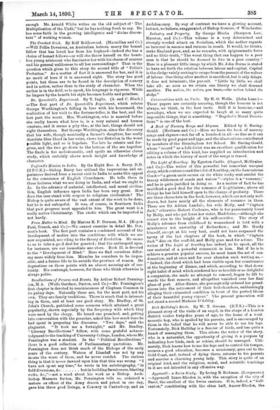Recollections of Persons and Events. By Arthur Robert Penning- ton,
M.A. (Wells Gardner, Darton, and Co.)—Mr. Pennington's first chapter is devoted to reminiscences of Clapham Common in its palmy days. Naturally these are, for the most part, not his own. They are family traditions. There is much that is interest- ing in them, and at least one good story. Mr. Bradley, of St. John's Church, published some sermons which attained a great popularity, shown especially by the frequency with which they were used by the clergy. He heard one preached, and, getting into conversation with the preacher, asked him how much time he had spent in preparing the discourse. "Two days," said the plagiarist. "It took me a fortnight," said Mr. Bradley. " Literary Recollections" follow, with some grateful acknow- ledgment to the teaching of University College, London, where Mr. Pennington was a student. In the "Political Recollections" there is a good collection of Parliamentary quotations. Mr. Pennington does not think much of the Bishops of the early years of the century. Watson of Llandaff was not by any means the worst of them, and he never resided. The curious thing is that it never dawned upon him that this was wrong. "I have not spsnt any time," he wrote in his autobiography, "in
field diversions, Ac but in building farmhouses, blasting rocks, &c.,"—not a word about his work as a Bishop. Arch- bishop Manners Sutton, Mr. Pennington tells us, ordained a mature ex-officer of the Army deacon and priest in one day, gave him three good livings, a Csnonry in Canterbury, and an Archdeaconry. By way of contrast we have a glowing account, but not, we believe, exaggerated, of Bishop Sumner, of Winchester.






































 Previous page
Previous page